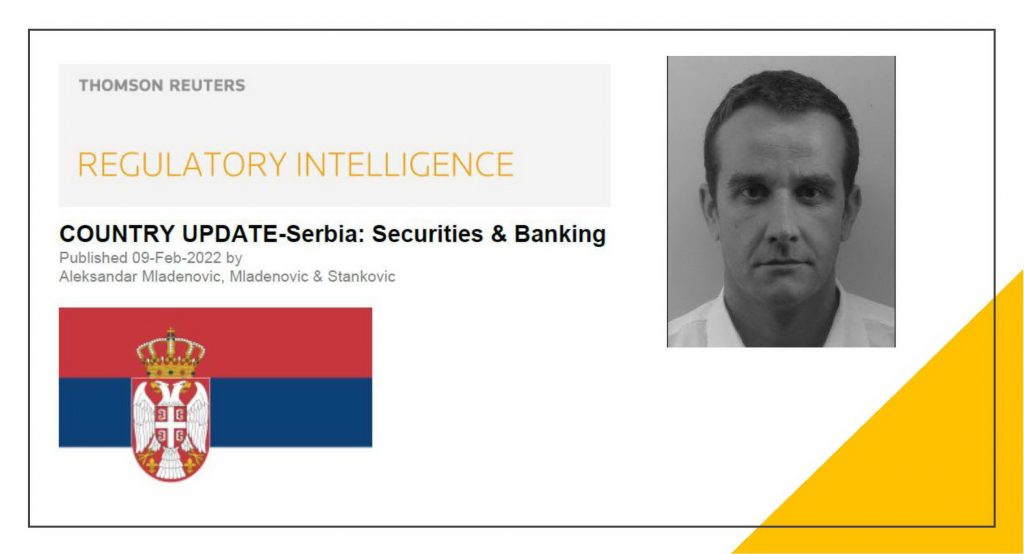Country update – Serbia: Securities & Banking
(Annual contribution by Aleksandar Mladenovic, Attorney at Law in Serbia (Mladenovic & Stankovic in cooperation with Rokas), published in Thomson Reuters, Regulatory Intelligence, Country update – Serbia: Securities & Banking, February 2022)

Securities — regulators
Securities Commission
Primary regulator in the area of securities is the Securities Commission, which is entrusted with safeguarding the orderly functioning of
the securities market, enhancing investor protection and ensuring integrity, efficiency and transparency of the market and overseeing
the application of the regulations in this area including the Capital Markets Act (Official Gazette of RS, No. 31/2011, 112/2015,
108/2016 and 9/2020) (hereinafter Capital Markets Act or Act), Act on Takeover of Joint Stock Companies (Official Gazette of RS,
No. 46/2006, 107/2009, 99/2011 and 108/2016) and the Law on Open Investment Funds with Public Offers (Official Gazette of RS,
73/2019).
Belgrade Stock Exchange
The activities of the market operator are entrusted to Belgrade Stock Exchange which exercises its competencies in relation to the
regulated markets and multilateral trading platform (MTP). In addition the activities of MTP operator can be performed by a broker-
dealer company or a Stock Exchange with a license from the Securities Commission.
Central Registry and Clearing House
Central Registry and Clearing House is in charge of the keeping of a registry of financial instruments, performing clearing and
settlement operations on the basis of transactions with financial instruments and registration of rights of third parties attached to
financial instruments or the transfer thereof.
Securities legislation
The main statute governing the securities regulation is the Capital Markets Act (O.G. of RS No. 31/2011 112/2015, 108/2016 and
9/2020) has been harmonised with the EU capital markets directives (Directive 2004/39/EC, Directive 2004/109/EC, Directive 2003/71/
EC, Directive 2003/6/EC, Directive 97/9/EC).
The Act establishes the authority of the main regulators and provides for organisation of financial instruments markets into following:
“regulated market” which includes listed and unlisted segments; and MTP. Furthermore, according to the Act, the trade may be also
carried out on the OTC through an intermediary company licensed by Securities Commission or even without the involvement of the
intermediary company, on the basis of sale and purchase agreements which has to be notified to the Central Registry and Clearing
House.
In addition to the Central Registry, the clearing and settlement of financial instruments issued by the Republic of Serbia may be
performed by one or more foreign legal entities engaged in, in accordance with the law governing public debt and the act of the Central
Registry.
The definition of financial instruments, licensing, operation and supervision of investment companies as well as licensing requirements
in relation to the market operators under the Act, have been transposed from the Directive 2004/39/EC. Accordingly, the following
financial instruments fall beyond the remit of the Act: insurance and reinsurance policies and other insurance products issued by
insurance companies; financial instruments issued in relation to turnover of goods and services, such as a bill of exchange, check,
written order (assignation), bill of lading, waybill or warehouse warrants; other documents relating to debt, money deposits or savings
that do not have properties of financial instruments; shares in a general partnership, limited partnership or limited liability companies.
